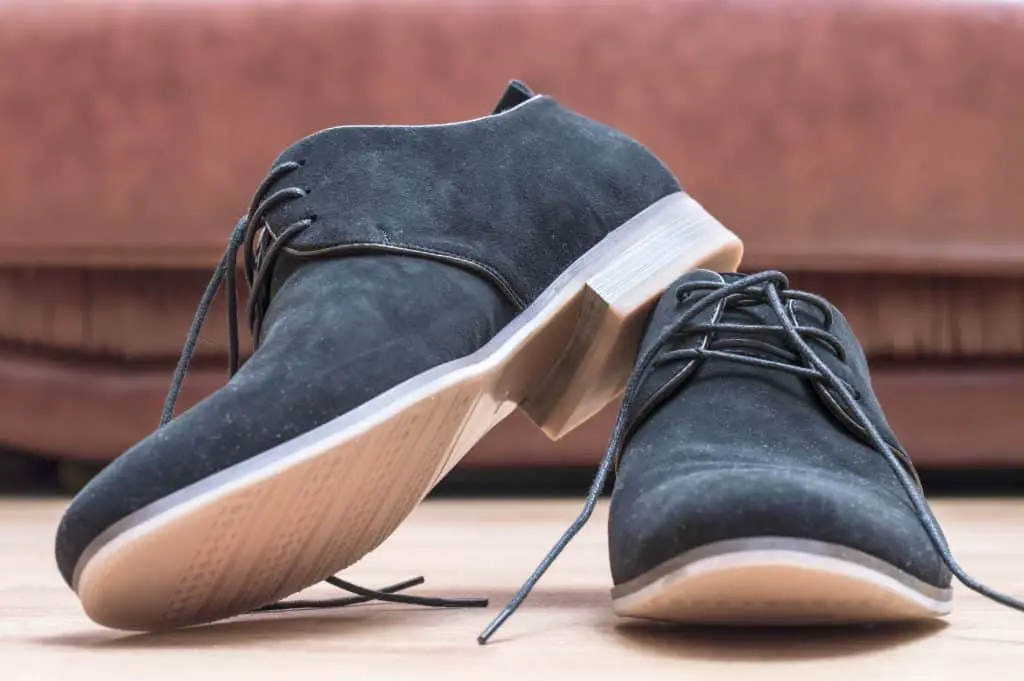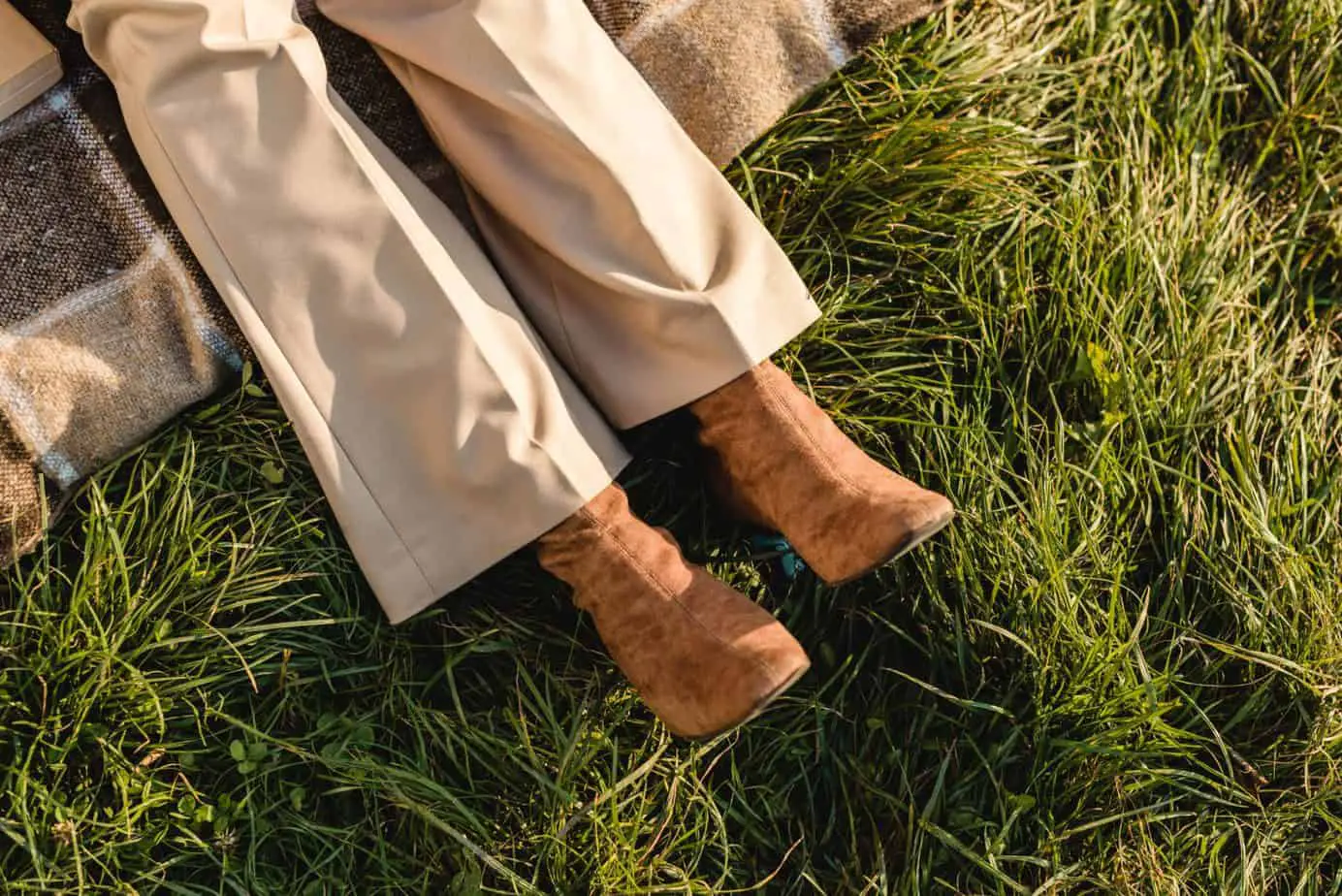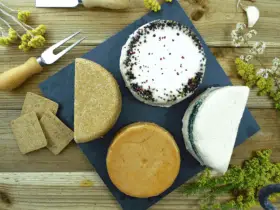It’s more common than you think that you’ll find vegans wearing suede sneakers, jackets, and handbags. That’s because suede can be misleading by the way it looks and feels. You may not think it’s an animal product at first glance.
However, it’s about time to know all the crimes behind the suede industry and why this fabric isn’t vegan. So, instead of singing “don’t you step on my blue suede shoes,” you’ll go saying “stay away from all suede shoes” or everything made from suede, for that matter.
What is Suede Fabric?
Suede has been a well-known fabric since the Paleolithic Era. Its name is derived from the French word “Gants de Suède.”
This term, which means “gloves from Sweden,” should give you a hint about the fanciness and allure of this fabric between the upper-class at the time. It has been gaining popularity to this day and used in all kinds of clothing, accessories, and footwear.
It’s a type of split-leather made from the lower layer of animals’ skin, mostly the skin of their bellies. The used hide comes mainly from lambs, but some manufactures also use goats, calves, pigs, and deer.
Because it’s made from the delicate interior skin layer, suede is one of the softest and most versatile materials out there. It takes its fuzziness from the tiny hair that covers animals at such delicate body parts.
However, it’s less durable than other types of leather and lacks the waterproofness and dirt resistance of fabrics made from animals’ exterior skin parts.
Owing to its napped finish, designers have been using it in bags, belts, and jackets. Yet, it’s most popular in the manufacture of Suede boots for its durability, comfort, and unique texture.
Is Suede Vegan?
First things first, suede isn’t a cruelty-free animal byproduct, so it’s by no means vegan.
There is a nice theory that says if it’s taken from animals who died from aging or killed by other animals, then it’s ethical to wear their skin instead of letting it go to waste. Well, that can only be applied if you raise a couple of lambs in your back garden and plan to use their leather after they die from natural causes. But in factory farms, the scenario is different.
What happens behind the scenes in industrial farms is cruel, starting from the day these animals are born and to the day they’re slaughtered for their skin.
Herders take young lambs and goats from their natural habitat and raise them in crowded and filthy farms. The cattle are torn from their families and held against their will to work for humans in their short lives only to be horrifically killed because we desire to wear posh suede boots.
Unfortunately, meat and leather industries are connected. In fact, leather is a byproduct of the meat industry, so it’s a given that these animals’ meat is sold in markets after being slaughtered.
Even the murder isn’t done mercifully. The animals are killed viciously without prior stunning, which means they go through this process in their conscious state. Others are subjected to the unforgivable act of skinning alive, leaving them to die slowly and painfully.
In short, you can’t expect the producers who only care about stacking their bank accounts with cash to care about the animals’ welfare. Hence, the argument about whether it’s vegan or not is still valid.
Suede’s Effect on Mother Earth
Sure, veganism, in its essence, is the rejection of animal exploitation for human benefit. Yet, lately, the term has expanded to include environmental issues and concerns.
Vegans who try to eat food that has less impact on the ecosystem consider wearing suede as a crime against the Earth. That’s because the leather industry is an extensive consumer of natural resources.
Due to the increase in demand, herders raise more animals to produce more meat and suede. The environmental impacts of these farms are severe as they rapidly consume green lands and water resources. Deforestation, water contamination, gas emissions, and climate changes are all consequences of this greedy industry.
Moreover, after the leather is torn from animals, it passes by several processes, including treatment with poisonous formaldehyde and tanning with carcinogenic chromium. Both chemicals are released in groundwater and cause lethal diseases to residents living nearby.
What about Vegan Suede?

Vegan suede, vegan leather, and faux leather are all synonyms to fake leather, the one made from cruelty-free substitutes like plastic, recycled paper, cork, fruit waste, and many other materials. Sometimes you’ll come across the word “pleather,” which combines both “plastic” and “leather,” referring to the fake material.
The idea of making leather without enslaving or killing animals spun the eyes of designers and encouraged them to release many animal-friendly leather products. Nowadays, you can find several faux suede bags, shoes, and accessories online or in stores.
For conventional vegans, this fabric is free from any kind of animal abuse, so they consider it safe to wear. However, environmental vegans have a different opinion.
> Read more: Our ultimate guide to faux suede.
Most vegan suede products are made from plastic, either polyvinyl chloride (PVC) or polyurethane (PU). Since plastic isn’t biodegradable, its waste pollutes the land and waterways. Hence, though indirectly, it affects animal and human life negatively.
Moreover, some factories get rid of plastic wastes through incineration. This results in the release of hazardous dioxins in the air, which contributes to the increase in the number of cancer patients.
Taking everything into account, we can conclude that faux leather isn’t eco-friendly. Yet, it’s still less risky to the planet than raising millions of animals and processing their skin with toxic substances. But the question is: why risk either the ecosystem or animals for an easily-replaceable fabric?
In Conclusion
It’s safe to say that we should avoid both materials since the harm they cause outweighs their benefits.
Animal leather is made to cover their flesh, not to be used for our benefit, and honestly, avoiding suede isn’t the end of the world!
Suede isn’t the best material out there. As we mentioned before, it lacks the advantages of full-grain leather. Imagine buying a couple of super pricey shoes only to have them ruined by a few droplets of rain! It’s not worth all the pain and suffering it causes.
There are many alternatives that would make us more humane, save the cattle, and preserve the environment in which we all live.
Finally, we advise you to pay attention to the tags of pretty much everything you buy. Suede is present in a wide range of products. You may even find out that the laptop case you purchased last week is actually made of it, and you never knew because you didn’t check.












Leave a Reply